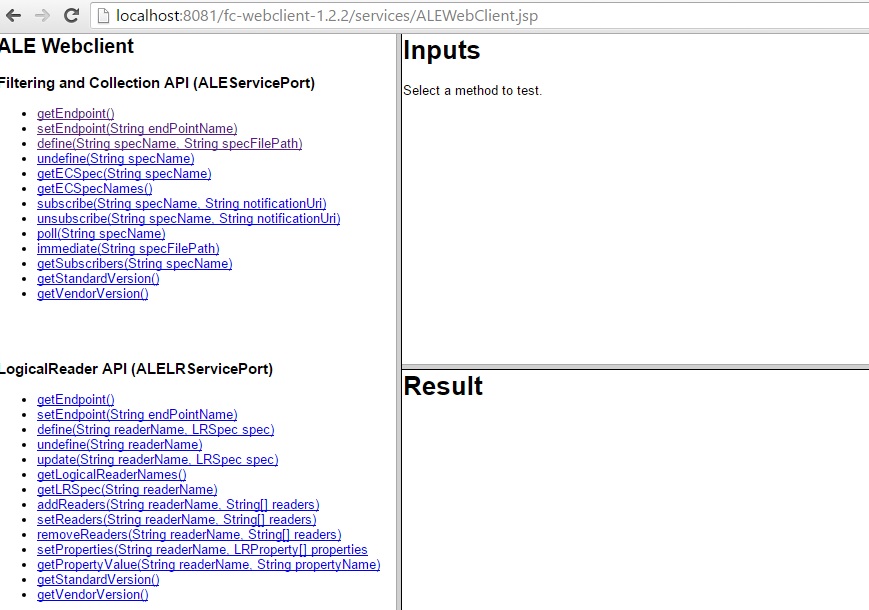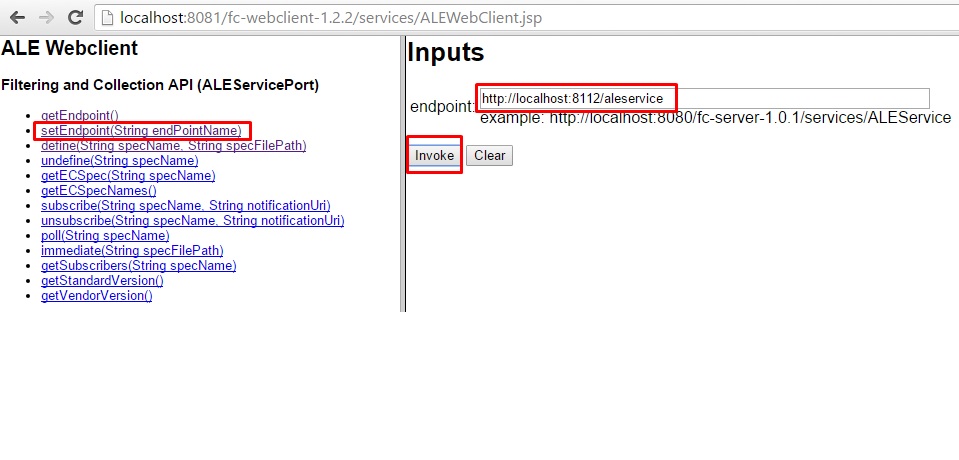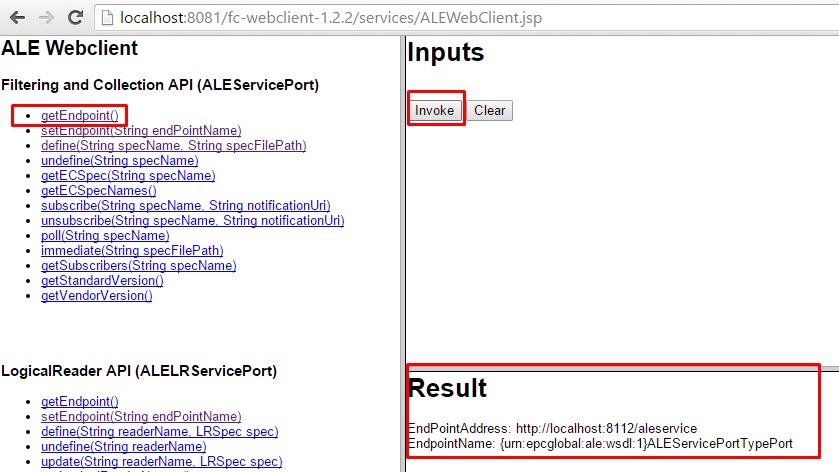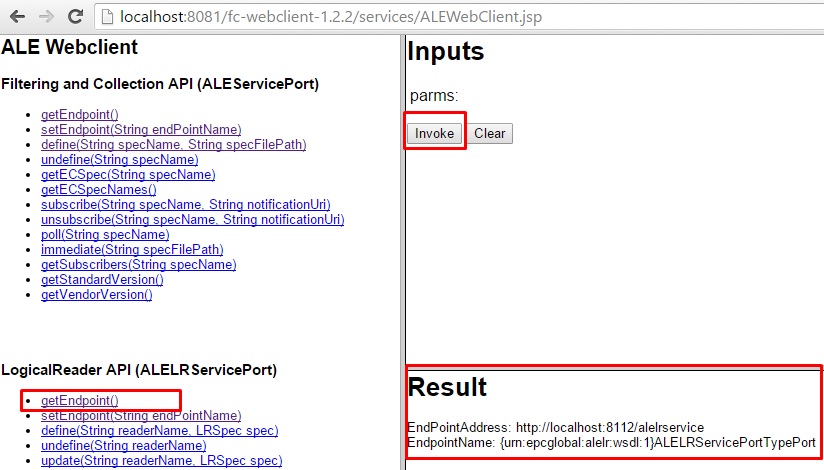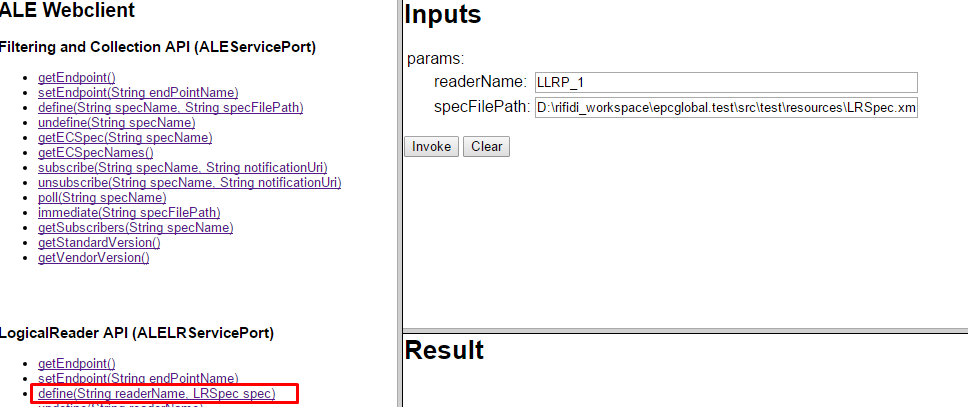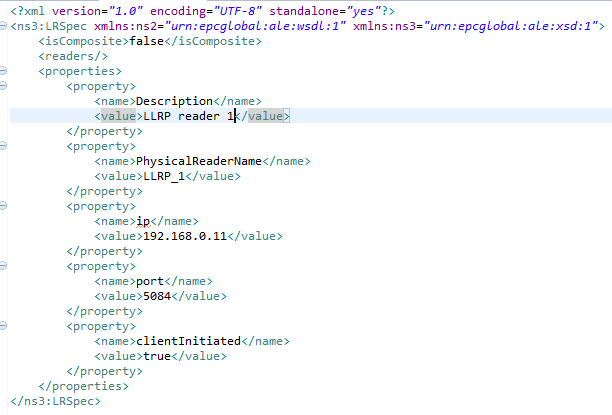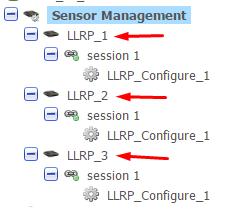Difference between revisions of "Application Level Events (ALE) User's Guide"
From RifidiWiki
(→Scenario 1: Defining base reader) |
|||
| Line 29: | Line 29: | ||
===4. Open web client application=== | ===4. Open web client application=== | ||
| − | You can follow this guide in order to install the ALE web client [[Media:ale_webclient_guide.docx]] | + | You can follow this guide in order to install the ALE web client [[Media:ale_webclient_guide.docx]] [[ALE Web Client Setup]] |
After successful deployment of ALE web client, point your web browser to http://localhost:8081/fc-webclient-1.2.0/services/ALEWebClient.jsp and you should see the web application to test ale and alelr web services: | After successful deployment of ALE web client, point your web browser to http://localhost:8081/fc-webclient-1.2.0/services/ALEWebClient.jsp and you should see the web application to test ale and alelr web services: | ||
Revision as of 22:31, 10 February 2016
Note: Leverage similar approach to REST - below is just my thoughts - open to other ways to approach
Contents
- 1 Introduction
- 2 Configuration
- 3 How to Test ALE Operations
- 4 ALE Operations Basic Flow
- 5 ALE Implementation
- 5.1 Ale Operations
- 5.1.1 define(String specName, String specFilePath)
- 5.1.2 undefine(String specName)
- 5.1.3 getECSpec(String specName)
- 5.1.4 getECSpecNames()
- 5.1.5 subscribe(String specName, String notificationURI)
- 5.1.6 unsubscribe(String specName, String notificationURI)
- 5.1.7 poll(String specName)
- 5.1.8 immediate(String specFilePath)
- 5.1.9 getSubscribers(String specName)
- 5.1.10 getStandardVersion()
- 5.1.11 getVendorVersion()
- 5.2 Error conditions
- 5.1 Ale Operations
- 6 ALELR Operations
- 6.1 define(String readerName, LRSpec spec)
- 6.2 undefine(String readerName)
- 6.3 update(String readerName, LRSpec spec)
- 6.4 getLogicalReaderNames()
- 6.5 getLRSpec(String readerName)
- 6.6 addReaders(String readerName, String[] readers)
- 6.7 setReaders(String readerName, String[] readers)
- 6.8 removeReaders(String readerName, String[] readers)
- 6.9 setProperties(String readerName, LRProperty[] properties)
- 6.10 getPropertyValue(String readerName, String propertyName)
- 6.11 getStandardVersion()
- 6.12 getVendorVersion()
- 7 Example Rifidi App/Client
Introduction
Configuration
#Port must be set -Dorg.rifidi.ale.port=8112 #ALE and ALELR web services start by default but this can be changed -Dorg.rifidi.ale.enabled=true
How to Test ALE Operations
Set up testing
Execute
1. Start Rifidi server
Start the Rifidi server
2. Start Rifidi emulator
Start the Rifidi emulator, create an LLRP reader type, start it, and then create some Gen2 tags, and drag and drop some of them to emulated reader's antenna
3. Validate ALE and ALELR Web services are running
To validate ALE Web service, go to http://localhost:8112/aleservice?wsdl and you should see the web service definition
To validate ALELR Web service, go to http://localhost:8112/alelrservice?wsdl and you should see the web service definition
If you do not get web service response, make sure you have set required JVM arguments, as described in configuration steps
4. Open web client application
You can follow this guide in order to install the ALE web client Media:ale_webclient_guide.docx ALE Web Client Setup
After successful deployment of ALE web client, point your web browser to http://localhost:8081/fc-webclient-1.2.0/services/ALEWebClient.jsp and you should see the web application to test ale and alelr web services:
5. Call setEndPoint(String endPointName) for ALE
Call setEndPoint(String endPointName) for ALE: Clic on setEndPoint(String endPointName) link in left ALE panel, then type the url http://localhost:8112/aleservice as the endpoint attribute, then clic Invoke
After this, verify the end point was appropriate set, by calling getEndPoint(), and you should see the endpoint address you set before:
6. Call setEndPoint(String endPointName) for ALELR
Call setEndPoint(String endPointName) for ALELR: Click on setEndPoint(String endPointName) linl in left ALELR panel, then type the url http://localhost:8112/alelrservice as the endpoint attribute, then clic Invoke
After this, verify the end point was appropriate set, by calling getEndPoint(), and you should see the endpoint address you set before:
Validate
ALE Operations Basic Flow
Here is an example of the basic flow for using ALE operations to get tag reads (current tags, addition and deletion) from a defined set of logical readzone(s) and the difference between using poll and immediate operations.
Scenario 1: Defining base reader
call ALELR define method with parameters:
- readerName: The name of logical reader to be used in Ale, not necessarily matching any reader id you have defined in Rifidi server.
- specFilePath: The specification file that defines the reader to be associated with this logical reader, in XML format, looks like:
Scenario 2: Defining composite reader
Scenario 1: Immediate flow
1. Start the Edge Server
Create Rifidi reader(s), if not already created.
2. Setendpoint ale
http://localhost:8112/aleservice
3. Setendpoint alelr
http://localhost:8112/alelrservice
4. Call the AleLR Define method
5. Call the Ale Define method
6. Call Immediate method
Scenario 2: Poll flow
Scenario 3: Async (MQTT) flow
Scenario 1: Current tags
- Define the ECSpecCurrent
- Define a subscriber, which subscribes to ECSpecCurrent
- Put one Tag on the reader. Tag must appear in all Reports until Tag is removed from reader
- Remove Tag from the reader. Tag must not appear in any Report from now on
<?xml version="1.0" encoding="UTF-8" standalone="yes"?>
<ns2:ECSpec xmlns:ns2="urn:epcglobal:ale:xsd:1">
<logicalReaders>
<logicalReader>LLRP_1</logicalReader>
</logicalReaders>
<boundarySpec>
<repeatPeriod unit="MS">15000</repeatPeriod>
<duration unit="MS">10000</duration>
<stableSetInterval unit="MS">0</stableSetInterval>
</boundarySpec>
<reportSpecs>
<reportSpec>
<reportSet set="CURRENT"/>
<output includeRawHex="true" includeRawDecimal="true" includeEPC="true"/>
</reportSpec>
</reportSpecs>
</ns2:ECSpec>
Scenario 2: Added tags
- Define the ECSpecAdditions
- Define a subscriber, which subscribes to ECSpecAdditions
- Put one Tag on reader. Tag must only appear in the first following Report
<?xml version="1.0" encoding="UTF-8" standalone="yes"?>
<ns2:ECSpec xmlns:ns2="urn:epcglobal:ale:xsd:1">
<logicalReaders>
<logicalReader>LLRP_1</logicalReader>
</logicalReaders>
<boundarySpec>
<repeatPeriod unit="MS">15000</repeatPeriod>
<duration unit="MS">10000</duration>
<stableSetInterval unit="MS">0</stableSetInterval>
</boundarySpec>
<reportSpecs>
<reportSpec>
<reportSet set="ADDITIONS"/>
<output includeRawHex="true" includeRawDecimal="true" includeEPC="true"/>
</reportSpec>
</reportSpecs>
</ns2:ECSpec>
Scenario 3: Deleted tags
- Define the ECSpecDeletions
- Define a subscriber, which subscribes to ECSpecDeletions
- Put one Tag on reader. Tag must not appear in the Report
- Remove Tag from reader. Tag must only appear in the first following Report
<?xml version="1.0" encoding="UTF-8" standalone="yes"?>
<ns2:ECSpec xmlns:ns2="urn:epcglobal:ale:xsd:1">
<logicalReaders>
<logicalReader>LLRP_1</logicalReader>
</logicalReaders>
<boundarySpec>
<repeatPeriod unit="MS">15000</repeatPeriod>
<duration unit="MS">10000</duration>
<stableSetInterval unit="MS">0</stableSetInterval>
</boundarySpec>
<reportSpecs>
<reportSpec>
<reportSet set="DELETIONS"/>
<output includeRawHex="true" includeRawDecimal="true" includeEPC="true"/>
</reportSpec>
</reportSpecs>
</ns2:ECSpec>
Scenario 4: Added and deleted tags
- Define the ECSpecAdditionsAndDeletions
- Define a subscriber, which subscribes to the mentioned ECSpec
- Put one Tag on reader. Tag must only appear in the first following Report
- Remove Tag from reader. Tag must only appear in the first following Report
<?xml version="1.0" encoding="UTF-8" standalone="yes"?>
<ns2:ECSpec xmlns:ns2="urn:epcglobal:ale:xsd:1">
<logicalReaders>
<logicalReader>LLRP_1</logicalReader>
</logicalReaders>
<boundarySpec>
<repeatPeriod unit="MS">15000</repeatPeriod>
<duration unit="MS">10000</duration>
<stableSetInterval unit="MS">0</stableSetInterval>
</boundarySpec>
<reportSpecs>
<reportSpec reportName="Additions">
<reportSet set="ADDITIONS"/>
<output includeRawHex="true" includeRawDecimal="true" includeEPC="true"/>
</reportSpec>
<reportSpec reportName="Deletions">
<reportSet set="DELETIONS"/>
<output includeRawHex="true" includeRawDecimal="true" includeEPC="true"/>
</reportSpec>
</reportSpecs>
</ns2:ECSpec>
ALE Implementation
Note: for each operation example request/response/wsdl
Ale Operations
define(String specName, String specFilePath)
Creates a new ECSpec having the name specName, according to spec
undefine(String specName)
Removes the ECSpec named specName that was previously created by the define method
getECSpec(String specName)
Returns the ECSpec that was provided when the ECSpec named specName was created by the define method.
getECSpecNames()
Returns an unordered list of the names of all ECSpecs that are visible to the caller.
subscribe(String specName, String notificationURI)
Adds a subscriber having the specified notificationURI to the set of current subscribers of the ECSpec named specName. The notificationURI parameter both identifies a specific binding of the ALECallback interface and specifies addressing information meaningful to that binding.
unsubscribe(String specName, String notificationURI)
Removes a subscriber having the specified notificationURI from the set of current subscribers of the ECSpec named specName.
poll(String specName)
Requests an activation of the ECSpec named specName, returning the results from the next event cycle to complete.
After calling poll service, the expected response is an xml like this:
<?xml version="1.0" encoding="UTF-8" standalone="yes"?> <ns3:ECReports specName="ReportGenerator_0_0" date="2016-01-17T21:36:40.966-05:00" ALEID="RIFIDI-ALE604974863" totalMilliseconds="9500" terminationCondition="DURATION" xmlns:ns2="urn:epcglobal:ale:wsdl:1" xmlns:ns3="urn:epcglobal:ale:xsd:1"> <reports> <report reportName="Cycle_1"> <group> <groupList> <member><epc>300e34d6e51161826493ff7e</epc></member> </groupList> </group> </report> </reports> </ns3:ECReports>
immediate(String specFilePath)
Creates an unnamed ECSpec according to spec, and immediately requests its activation.
After calling immediate service, the expected response is an xml like this:
<?xml version="1.0" encoding="UTF-8" standalone="yes"?> <ns2:ECReports specName="ReportGenerator_0_0" date="2016-01-18T16:32:36.500-05:00" ALEID="RIFIDI-ALE-293181330" totalMilliseconds="9500" terminationCondition="DURATION" xmlns:ns2="urn:epcglobal:ale:xsd:1" xmlns:ns3="urn:epcglobal:ale:wsdl:1"> <reports> <report reportName="Cycle_1"> <group> <groupList> <member><epc>300e34d6e51161826493ff7e</epc></member> </groupList> </group> </report> </reports> </ns2:ECReports>
getSubscribers(String specName)
Returns an unordered, possibly empty list of the notification URIs corresponding to each of the current subscribers for the ECSpec named specName.
getStandardVersion()
Returns a string that identifies what version of the specification this implementation of the Reading API complies with.
getVendorVersion()
Returns a string that identifies what vendor extensions this implementation of the Reading API provides.
Error conditions
Methods of the ALE Reading API signal error conditions to the client by means of exceptions. The following exceptions are defined. All the exception types in the following table are extensions of a common ALEException base type, which contains one string element giving the reason for the exception.
SecurityException
The operation was not permitted due to an access control violation or other security concern.
DuplicateNameException
The specified ECSpec name already exists. Note that the existence of a CCSpec having the same name does not cause this exception; ECSpecs and CCSpecs are in different namespaces.
ECSpecValidationException
The specified ECSpec is invalid. The define and immediate methods of the ALE API SHALL raise an ECSpecValidationException if any of the following are true:
- The specified
specNameis an empty string or is not accepted by the implementation - The
logicalReadersparameter ofECSpecis null, omitted, is an empty list, or contains any logical reader names that are not known to the implementation. - The
boundarySpecparameter ofECSpecis null or omitted. - The
duration,stableSetInterval, orrepeatPeriodparameter ofECBoundarySpecis negative. - The value of the
startTriggerorstopTriggerparameter ofECBoundarySpec, or any element of thestartTriggerListorstopTriggerListparameter ofECBoundarySpecdoes not conform to URI syntax as defined by [RFC2396], or is a URI that is not supported by the ALE implementation. Note that an empty string does not conform to URI syntax as defined by [RFC2396]. - No stopping condition is specified in
ECBoundarySpec; i.e.,stopTriggeris omitted or null,stopTriggerListis empty,whenDataAvailableis false, and neitherdurationnorstableSetIntervalnor any vendor extension stopping condition is specified. - The
reportSpecsparameter ofECSpecis null, omitted, or empty. - Any
ECReportSpecinstance has areportNamethat is an empty string or that is not accepted by the implementation. - Two
ECReportSpecinstances have identical values for theirreportNamefields. - Any member of
includePatternsorexcludePatternswithinECFilterSpecdoes not conform to theepc-tagformat’s filter syntax - Two members of the
fieldListparameter of anyECReportOutputSpecinstance have the same name. - The
fieldspecparameter of anyECFilterListMemberinstance is invalid. - The
patListparameter of anyECFilterListMemberinstance is empty, null, or omitted, or any element ofpatListdoes not conform to the syntax rules for patterns implied by the specifiedfieldspec. - The
fieldspecparameter ofECGroupSpecis invalid. - The
fieldspecparameter ofECGroupSpecimplies a datatype and format for which no grouping pattern syntax is defined. - Any grouping pattern within the
patternListparameter ofECGroupSpecdoes not conform to the syntax for grouping patterns implied by the specifiedfieldspec. - Any two grouping patterns within the
patternListparameter ofECGroupSpecare not disjoint, according to the definition of disjointedness defined by the datatype and format implied by the specifiedfieldspec. - Any member of the
fieldListparameter withinECReportOutputSpecis an invalid fieldspec. - Any member of the
primaryKeyFieldsparameter ofECSpecis not a known fieldname. - The implementation does not support the specified
primaryKeyFieldsvalue ofECSpecwith the specified logical readers. An implementation SHALL NOT, however, raise the exception ifprimaryKeyFieldsis omitted or its value is a list consisting of the single elementepc. - For any
ECReportOutputSpecinstance, all five booleansincludeEPC,includeTag,includeRawHex,includeRawDecimal, andincludeCountare false,fieldListis empty or omitted, and there is no vendor extension toECReportOutputSpec. - Any value of
ECStatProfileNameis not recognized, or is recognized but the 2693 specified statistics report is not supported.
InvalidURIException
The URI specified for a subscriber does not conform to URI syntax as specified in [RFC2396], does not name a binding of the ALECallback interface recognized by the implementation, or violates syntax or other rules imposed by a particular binding.
NoSuchNameException
The specified ECSpec name does not exist.
NoSuchSubscriberException
The specified subscriber does not exist.
DuplicateSubscriptionException
The specified ECSpec name and subscriber URI is identical to a previous subscription that was created and not yet unsubscribed.
ImplementationException
A generic exception raised by the implementation for reasons that are implementation-specific. This exception contains one additional element: a severity member whose values are either ERROR or SEVERE. ERROR indicates that the ALE implementation is left in the same state it had before the operation was attempted. SEVERE indicates that the ALE implementation is left in an indeterminate state.
ALELR Operations
define(String readerName, LRSpec spec)
Creates a new logical reader named name according to spec.
undefine(String readerName)
Removes the logical reader named name
update(String readerName, LRSpec spec)
Changes the definition of the logical reader named name to match the specification in the spec parameter. This is different than calling undefine followed by define, because update may be called even if there are defined ECSpecs, CCSpecs, or other logical readers that refer to this logical reader.
getLogicalReaderNames()
Returns an unordered list of the names of all logical readers that are visible to the caller. This list SHALL include both composite readers and base readers.
getLRSpec(String readerName)
Returns an LRSpec that describes the logical reader named name.
addReaders(String readerName, String[] readers)
Adds the specified logical readers to the list of component readers for the composite logical reader named name. This is equivalent to calling getLRSpec, modifying the LRSpec that is returned to include the specified logical readers in the reader list, and then calling update with the modified LRSpec.
setReaders(String readerName, String[] readers)
Changes the list of component readers for the composite logical reader named name to the specified list. This is equivalent to calling getLRSpec, modifying the LRSpec that is returned by replacing the reader list with the specified list of logical readers, and then calling update with the modified LRSpec.
removeReaders(String readerName, String[] readers)
Removes the specified logical readers from the list of component readers for the composite logical reader named name. Any reader name within readers that is not currently among the component readers of the specified logical reader is ignored. This is equivalent to calling getLRSpec, modifying the LRSpec that is returned by removing any references to logical readers in the specified reader list, and then calling update with the modified LRSpec.
setProperties(String readerName, LRProperty[] properties)
Changes properties for the logical reader named name to the specified list. This is equivalent to calling getLRSpec, modifying the properties in the LRSpec according to the table below, and then calling update with the modified LRSpec.
getPropertyValue(String readerName, String propertyName)
Returns the current value of the specified property for the specified reader, or null if the specified reader does not have a property with the specified name.
getStandardVersion()
Returns a string that identifies what version of the specification this implementation of the ALE Logical Reader API complies with.
getVendorVersion()
Returns a string that identifies what vendor extensions of the ALE Logical Reader API this implementation provides.
